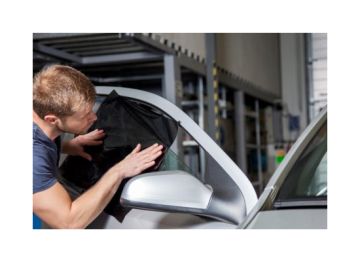
Car windows don’t protect against harmful sun exposure, so it might be a good idea to wear sunglasses and sun block even while driving, a new study suggests.
While windshields blocked the vast majority of ultraviolet (UV) radiation from the sun, car door windows offered varying levels of protection from the rays that are tied to cataracts and skin aging.
“Some cars were as low as 50 percent blockage,” said researcher Dr. Brian Boxer Wachler of the Boxer Wachler Vision Institute in Beverly Hill, California.
“Even cars that came with factory tint, there was no guarantee that would protect against UV rays,” he told Reuters Health.
UV rays account for a small portion of the sun’s rays but are the most damaging to human skin. UV-A rays are the most common and penetrate most deeply, according to the Skin Cancer Foundation.
Because drivers in the U.S. have their left side exposed to sunlight, UV rays have been blamed for the increased number of cataracts and skin cancers that occur on the left side, Boxer Wachler writes in JAMA Ophthalmology.
UV rays can pass through clouds and glass. To see whether car windows are protective, Boxer Wachler took a UV-A light meter to a number of Los Angeles car dealers on a cloudless May day in 2014.
He tested 29 cars from 15 different manufacturers, made between 1990 and 2014.
On average, car windshields blocked about 96 percent of UV-A rays. The protection afforded by individual cars ranged from 95 to 98 percent.
But side door windows were far less dependable. The percentage of UV-A rays blocked varied from 44 percent to 96 percent. Only four of the 29 cars had windows that blocked more than 90 percent of UV-A rays.
“It had no correlation at all with the cost of the car, high-end car or low-end car,” said Boxer Wachler.
Windshields are more protective than car door windows because they must be made of laminated glass to prevent shattering, writes Dr. Jayne Weiss in a commentary published with the study. Car door windows, however, are usually just tempered glass.
“Don’t assume because you are in an automobile and the window is closed that you’re protected from UV light,” she told Reuters Health.
“For the eyes, your best bet is to get sunglasses that block UV-A and UV-B light and wraparound the face,” said Weiss, who directs the Louisiana State University Eye Center of Excellence in New Orleans.
Some of the car windows in this study let in enough UV-A rays to affect skin health, said Dr. Paul Nghiem, who heads the division of dermatology at the University of Washington in Seattle.
“Wearing long sleeve clothing, or sunscreen that is ‘broad spectrum’ would be extremely effective and seems indicated on long drives on sunny days,” Nghiem, who was not involved with the new study, told Reuters Health by email.
People can also get clear UV filters added to their car windows to protect from the damaging rays, said Boxer Wachler.




